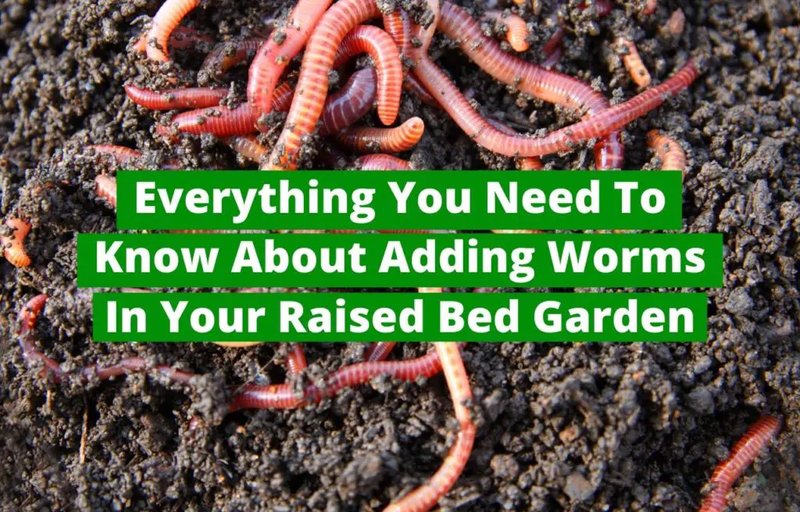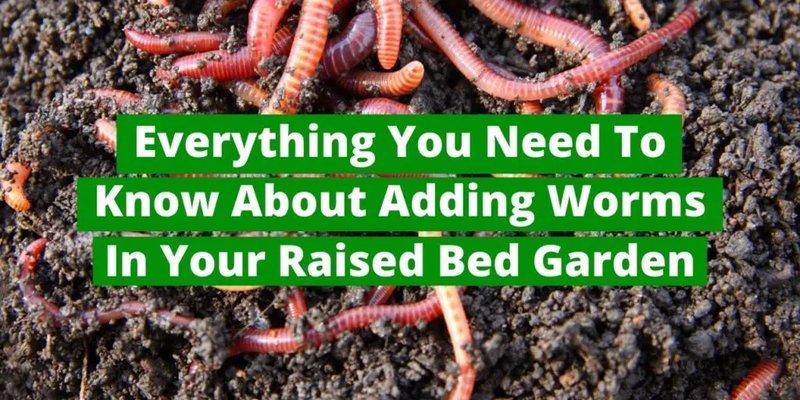
Raised garden beds have gained popularity for many reasons. They keep your plants free from weeds, improve drainage, and make gardening a bit easier on our backs. But what about the earthworms? You might wonder if these little guys can thrive in such an environment, or if they’ll just wriggle away. We’ll explore how raised garden beds affect earthworm populations and what you can do to create the best conditions for them.
Understanding Earthworms’ Role in Gardening
Earthworms play a crucial role in maintaining healthy garden ecosystems. They help aerate the soil, making it easier for plant roots to access water and nutrients. As they munch on organic matter like dead leaves and decomposing plants, they convert it into nutrient-rich castings—essentially, worm poop—which enriches the soil. This natural fertilizer improves soil structure, promoting better water retention and drainage.
Now, you might be asking, why should I care about earthworms in my raised garden beds? Well, the presence of earthworms indicates that your soil is healthy and full of life. It’s like having a little army of gardeners doing their work while you plan your next planting adventure. Plus, more earthworms typically mean healthier plants, which can lead to better yields. It’s a win-win!
Can Earthworms Thrive in Raised Garden Beds?
Absolutely! Earthworms can not only survive but often thrive in raised garden beds. In fact, these beds can provide a more favorable environment compared to traditional garden plots. The soil in raised beds is usually looser and richer in organic matter, creating ideal conditions for earthworms.
Moreover, the controlled environment of raised beds helps maintain moisture levels. Earthworms love a moist habitat, as dry conditions can be fatal for them. The extra care we give to raised beds—like regular watering and mulching—can create a worm-friendly environment. So, if you’re worried about your little wriggly friends, rest assured that they’re likely enjoying their new home.
What Makes Raised Garden Beds Friendly to Earthworms?
Several factors contribute to the suitability of raised garden beds for earthworms. Here are some of the key elements:
- Soil Quality: Raised beds are often filled with a mix of soil and organic matter, such as compost. This rich mixture provides a buffet for earthworms, ensuring they have enough food.
- Moisture Retention: The soil in raised beds usually retains moisture better than standard garden soil. Earthworms thrive in moist conditions, which helps them survive and reproduce.
- Minimal Disturbance: Raised beds are typically less disturbed than traditional gardens. Earthworms prefer stable environments, and constant digging and tilling can stress them out.
- Temperature Control: Raised beds can warm up faster in spring, providing a cozy environment for earthworms to be active earlier in the season.
So, if you’re thinking of building a raised garden bed, not only will it benefit your plants, but it will also create a welcoming home for earthworms.
How to Create an Earthworm-Friendly Environment
If you want to encourage earthworms in your raised garden beds, there are a few steps you can take to ensure they have a comfortable habitat. Here’s how:
1. **Add Organic Matter:** Regularly incorporate compost, leaf litter, or well-rotted manure into your soil mix. This not only provides food for earthworms but also improves soil texture.
2. **Practice Minimal Tillage:** Try to disturb the soil as little as possible. Instead of digging, consider using techniques like mulching or planting cover crops that help cover and enrich the soil without digging it up.
3. **Maintain Moisture Levels:** Ensure that your raised beds are adequately watered, especially during dry spells. You want to create a moisture-retaining environment, not a soggy mess, so aim for consistency.
4. **Avoid Chemicals:** Pesticides and chemical fertilizers can harm earthworms and disrupt their natural behaviors. Opt for organic gardening practices to keep your worm friends safe.
Each of these steps contributes to a thriving ecosystem in your raised garden bed, and who doesn’t want more earthworms working hard for their plants?
What Happens if Earthworms Don’t Survive?
While raised garden beds are usually a great home for earthworms, there can be issues that lead to their decline. If earthworms are not surviving in your raised bed, it could be due to a few reasons:
1. **Too Much Water:** While earthworms need moisture, too much can drown them. Make sure your raised beds drain well and don’t retain excess water.
2. **Poor Soil Quality:** If your raised bed consists mostly of sterile materials like sand or gravel, earthworms won’t have the nutrients or food they need.
3. **Chemical Exposure:** As mentioned earlier, chemicals used in gardening can harm earthworms. Always check the products you’re using to ensure they’re safe for beneficial soil organisms.
4. **Extreme Temperatures:** Earthworms prefer moderate temperatures. If your bed gets too hot in the summer or too cold in the winter, it could impact their survival.
Recognizing these risks can help you take action to ensure your earthworm population remains healthy.
Incorporating earthworms into your gardening journey isn’t just about having a thriving raised garden bed; it’s about fostering a healthy ecosystem that benefits your plants and contributes to sustainable gardening practices. By understanding the important role these little creatures play, you can take steps to create the ideal environment for them to thrive.
Remember, a healthy population of earthworms is a sign of a vibrant garden. So as you plan your next round of planting, think of your wormy friends and how you can encourage them to stay and help out. With just a few small adjustments, you can ensure that your raised garden beds are a welcoming home for these nature’s recyclers. Happy gardening!

